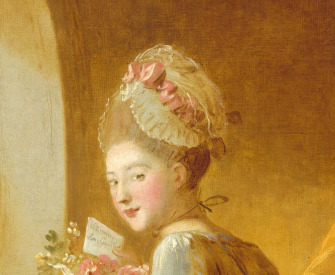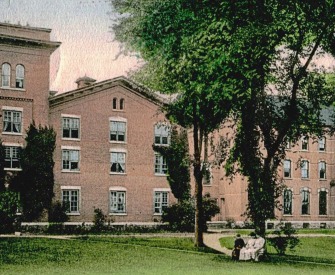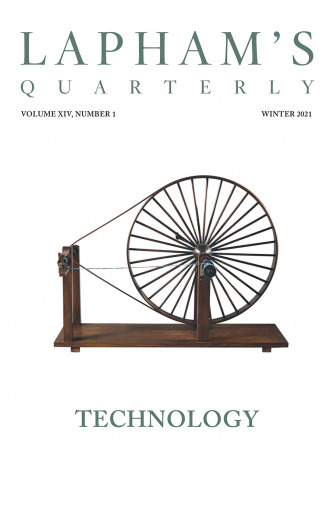[Enter Géronte, leading Lucinde by the hand.]
Géronte: Here is my daughter.
Sganarelle: Is this the patient?
Géronte: Yes, my only child. I should never recover if anything were to happen to her. If she should die—
Sganarelle: Impossible, Monsieur. She cannot die without a regular prescription from the academy.
Géronte: Bring a chair, there.
[A chair is brought.]
Sganarelle: Not so bad, this patient!
Géronte: She smiles, Monsieur; you have made her smile.
Sganarelle: Of course, Monsieur, it’s my business. This is fine. It is a very good symptom. Well, Mademoiselle, what ails you? What pains do you feel?
Lucinde: [making gesticulations] Ouch, oi, oi!
Sganarelle: What’s that?
Lucinde: Oi, oi.
Sganarelle: Ouh, ouh, oi, oi, I don’t understand your deuced language!
Géronte: That’s just what’s the matter, Monsieur. She is dumb, and I have been compelled to put off the marriage.
Sganarelle: Why was that?
Géronte: The man she is to marry wants to wait for her recovery.
Sganarelle: Show me the man who doesn’t want his wife dumb! I only wish mine had that malady! I should see that she wasn’t soon cured!
Géronte: Well, cure this case, at any rate.
Sganarelle: Don’t worry, Monsieur. Is her pain very acute?
Géronte: Yes, very.
Sganarelle: That’s right. [to Lucinde] Let me feel your pulse. [to Géronte] Monsieur, I am enlightened as to your daughter’s condition: she is dumb!
Géronte: Yes, that’s just it. You have found it out immediately.
Sganarelle: Of course! We great doctors know things at once. A fool would have been disturbed and puzzled, and would have beat about the bush. But I tell you plainly: your daughter is dumb.
Géronte: Yes, but how did it happen?
Sganarelle: Very simply: she lost her speech.
Géronte: Very good; but why?
Sganarelle: Our best authorities seem to agree that it arises from an impediment of the tongue.
Géronte: Yes, but tell me the causes. The authorities must surely—
Sganarelle: Well, Aristotle says—many fine things.
Géronte: I can readily believe it.
Sganarelle: He was a great man.
Géronte: No doubt of it.
Sganarelle: A very great man; a man who was far greater than I am. But to return to the question: I am of the opinion that this impediment arises from some certain peccant humors. Peccant—that is to say—a—a—peccant. For, as the vapors exhumed are formed by a certain exhalation of circuitous—a—you understand Latin?
Géronte: No.
Sganarelle: What, you don’t understand Latin?
Géronte: No.
Sganarelle: Carborias influxorioum arci thrumbi thantrat—
Géronte: Ah, why didn’t I study when I was young?
Sganarelle: So these vapors, passing from the left to the right side, come into contact with the lungs—Latin, armyan—Hebrew, polyglum—and from there they proceed immediately to the—please follow me more closely.
Géronte: I am.
Sganarelle: And have a certain malignity by a—pay attention to me.
Géronte: I am, Monsieur.
Sganarelle: Which is always caused by the sharpness of these, and the concavity of the diaphragm—nequaquam in uterque imibus. And therefore your daughter is dumb.
Géronte: No one could possibly argue better. But, Monsieur, what do you think should be done?
Sganarelle: What do I think should be done?
Géronte: Yes.
Sganarelle: Well, I suggest that she be put immediately to bed, and take plenty of bread and wine.
Géronte: Why, if you please?
Sganarelle: Because this wonderful combination often produces speech.
Géronte: What a great man you are! Quick, bring some bread and wine!
Sganarelle: I shall soon return to see how the patient is getting on. I wish you good day.
Géronte: One moment, please.
Sganarelle: What do you want?
Géronte: To give you your fee.
Sganarelle: [holding out his hand] I shall not take it.
Géronte: Ah, Monsieur!
Sganarelle: Not at all.
Géronte: I beg of you—
Sganarelle: I will not. I do not practice for money.
Géronte: I’m quite sure of that.
Sganarelle: [taking the money] Is it full weight?
Géronte: Certainly.
Sganarelle: I am not a mercenary doctor.
Géronte: I can readily believe it.
Sganarelle: I am not inspired by any base desire for gold. No, not at all.
Géronte: I don’t doubt it in the least. Well, I bid you good day.
Sganarelle: Good day, Monsieur. Don’t forget. I never practice for money.
[Géronte goes out. Enter Léandre.]
Sganarelle: Well, this isn’t so bad after all
Léandre: I beg your pardon, Monsieur—I wish some help—I am—
Sganarelle: [goes up to him and feels his pulse] Your pulse is very bad. You have a severe case of—
Léandre: I’m not sick, Monsieur; it isn’t that I came to see you about.
Sganarelle: If you are not sick, why the deuce don’t you say so? How am I to know?
From The Doctor in Spite of Himself. Born Jean-Baptiste Poquelin in Paris in 1622, the dramatist renounced his inherited right to a royal appointment in 1643 and proceeded to help found a theater company for which he soon served as a casting director and then as its head. He adopted Molière as his stage name in 1644. In the mid-1660s, the Catholic Church denounced his comedies Don Juan and Tartuffe. In a public letter defending the latter, Molière wrote, “The comic is the outward and visible form that nature’s bounty has attached to everything unreasonable, so that we should see, and avoid, it.”
Back to Issue



